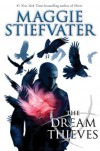
I really didn't want to write this review because I hate being an outlier, especially when I'm being Debbie Downer. I fully expected to love this one. After all, I gave Cinder four stars and by all accounts Scarlet is even better. Perhaps I was expecting too much, but I also have to chalk some of the discrepancy to a change in taste. The things that irritated me about Scarlet were issues I noted with Cinder, only they were more problematic for me this time around.
The first sign that Scarlet and I weren't going to get along was my irritation over the writing style. It is very juvenile. There is a lot of telling and very little showing, and everything is told in a very simplistic way (as opposed to Leigh Bardugo's Shadow and Bone, which also has a fair amount of telling but with very pretty prose). Instead of providing visual or auditory clues to show character emotion, characters in this novel say things in a/an [insert emotion] way, or [insert emotion] radiates off of the character, or [insert emotion] is written all over the character's face, or one character senses that another character is feeling [insert emotion]. This made it hard to visualize many of the scenes, and kept me from vicariously experiencing the story.
As with Cinder, the world-building, both in terms of history and present scenery, is lacking. By the end of the second book, there should be a clearer picture of how this post-apocalyptic world came to be, yet the reader is given no more details about the vague world wars and consolidation of countries than in the first book. While I do think there was some improvement in the description of the current scenery—there are actual French landmarks mentioned in Paris—the setting was still superficial. I could find nothing to distinguish Asian, American, and European culture aside from Europe having wine and Asia having dragon decor.
In terms of plot, Scarlet suffers from predictability issues, partly because the story follows Little Red Riding Hood and partly because much of Wolf's character is spoiled by The Queen's Army. I think I would have enjoyed Scarlet more if Wolf's history had been a mystery. The Queen's Army is a nice addition to the series but would be better read after Scarlet. There were also a couple plot twists that were obvious to me because I knew the story of Little Red Riding Hood. There was no question in my mind that Wolf was going to betray Scarlet and that his finding her was all part of the plan because of the fairytale. I think the story would have been stronger had I been less certain of Wolf's motivations. While Cinder also had predictability issues related to Cinder's history, I thought there was enough suspense in other areas to sustain the story despite its predictability.
In the end, the most problematic aspect of Scarlet is the characters and their utter stupidity and nonsensical thinking. They all have a real blind spot when it comes to figuring out that Cinder is Princess Selene. Kai still doesn't figure it out, nor does Captain Thorne despite having clear evidence thrown in his face. But it's Scarlet and Wolf who win the award for most oblivious. They know that Princess Selene was adopted by a man from the Eastern Commonwealth, that his surname is Linh, that there is a Lunar teenage fugitive whose surname is also Linh, that she is the same age as Princess Selene, and that she is wanted by Queen Levana, and they don't figure it out. Their lack of reasoning is unbelievable and it makes them both look like idiots.
Character stupidity does not end at Princess Selene's true identity. Scarlet shows poor judgment in trusting Wolf after knowing him only a day. In fact, she doesn't truly begin to trust him until after she finds out that he's been lying to her the entire time they've been together. Instead of taking this information to mean he isn't trustworthy (the logical conclusion), she proceeds to fall in love with him almost instantaneously. While there is no love at first sight between Scarlet and Wolf, the love between them comes out of no where and is baseless. Despite having met only a week prior and having spent maybe two days together total, by the end of the story they have fallen in love, risked their lives for each other, and decide to be life partners. Kai's solution to the Lunar problem also makes absolutely no logical sense. I can't give him credit for nobility because he's only making the situation worse. His decision to marry Queen Levana doesn't reduce the Lunar threat, and, in fact, increases it. He knows Queen Levana plans to kill him after they're married and use the Commonwealth as a stepping stone to taking over the planet. Marrying her does bring about temporary peace, but it also puts Earth in more danger. None of the characters are particularly intelligent.
Lastly, Meyer gives inaccurate information about the social structure of wolves. This indicates a lack of research, which is one of my biggest pet peeves. Even Wikipedia gets it right, and there are several free scientific journal articles on that subject that are readily available. While it would certainly make sense for Wolf and his hybrid pack to behave as they do (with betas and omegas and such), it's misleading to suggest that this is how wolves behave in the wild.
While I did not enjoy Scarlet, I do think most people who liked Cinder will like this one as well. The things people loved about Cinder are still true in Scarlet. The plot is fast-paced and the female characters are strong-willed, however, I would caution people away from this book if they are at all sensitive to shallow world-building, simplistic writing, obvious plot points, or oblivious characters.







